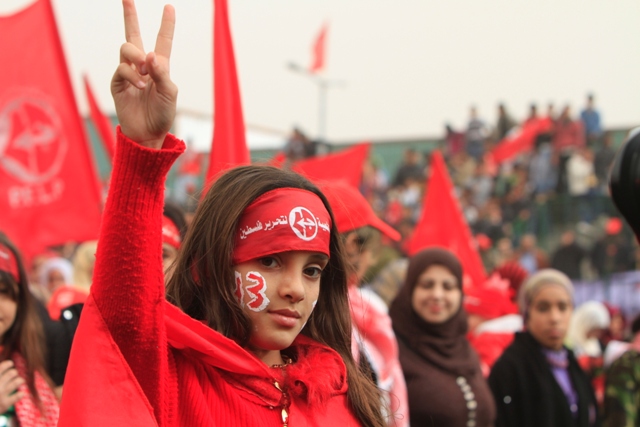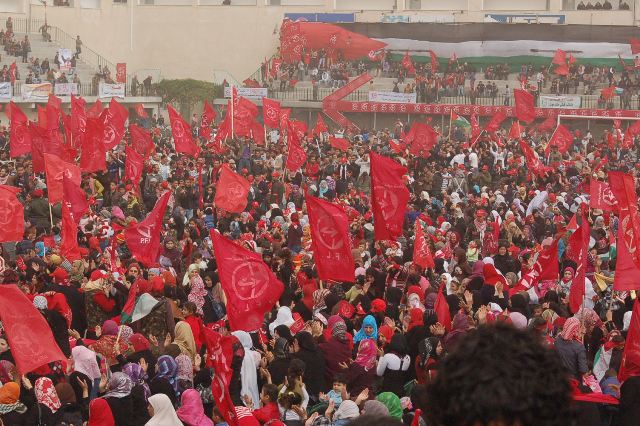Cory Doctorow, Tor and craphound.com, 2010
The Spark December 2010 – January 2011
Byron Clark
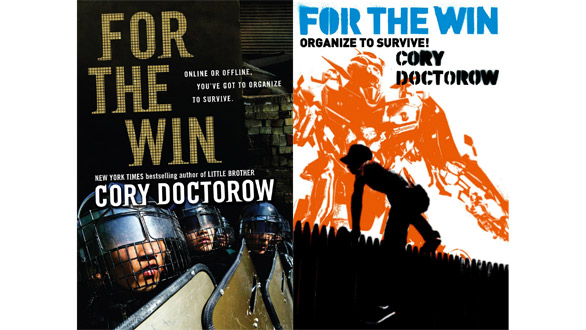 ‘For The Win’ is possibly one of 2010’s best works of fiction, at least for those readers who enjoy books that deal with big issues. Paraphrasing other writers in the genre, author Cory Doctorow has said that “good science fiction predicts the present” and part of what makes the novel so enjoyable is that this story could be taking place next year. While his last novel, Little Brother, explored issues around civil liberties and state power in the post-9/11 USA, For The Win shows that Doctorow’s unashamedly left-wing worldview extends to many other issues; globalisation, inequality, labour rights and the farcical nature of finance capitalism are all explored in the space of 375 pages.
‘For The Win’ is possibly one of 2010’s best works of fiction, at least for those readers who enjoy books that deal with big issues. Paraphrasing other writers in the genre, author Cory Doctorow has said that “good science fiction predicts the present” and part of what makes the novel so enjoyable is that this story could be taking place next year. While his last novel, Little Brother, explored issues around civil liberties and state power in the post-9/11 USA, For The Win shows that Doctorow’s unashamedly left-wing worldview extends to many other issues; globalisation, inequality, labour rights and the farcical nature of finance capitalism are all explored in the space of 375 pages.
The story revolves around “gold farming” the practice of amassing virtual wealth in an online multi-player video game, and then selling it for real-world currency. Typically, that virtual wealth is collected by people in the developing world, and sold to players in the developed world who want to avoid the work required to advance in the game. For the gold farmers, the income is comparable to what they could earn working in other available jobs. Of course, most of these gold farmers don’t own the computers and internet connections required to be a gold farmer (the means of production-albeit production of virtual commodities) and work for bosses who expropriate most of the wealth they create. Looking to remedy this situation is Big Sister Nor, a former garment factory worker in Malaysia who became a gold farmer after a strike caused the owners to move the factory to Indonesia. Nor has founded the “Industrial Workers of the World Wide Web” or “Webblies” (a homage to the Industrial Workers of the World (also known as Wobblies), the syndicalist union that had its heyday a century ago) and is organising gold farmers across borders in the virtual worlds they work in. Continue reading “Book Review: For the Win”
NZ Council of Trade Unions on Trans-Pacific Partnership Agreement / A worker's comment
“Trade is only a small part of these negotiations”, said Bill Rosenberg, CTU Policy Director and Economist, who will be the CTU observer. “In fact most of the proposed agreement covers areas like foreign investment rules, empowering foreign companies to sue our government, opening our services to more international competition, our right to regulate, pharmaceutical costs, intellectual property rights, and preventing use of government procurement to help local firms.”
Don: That mixes possible working class concerns with local capitalist concerns as if they were the same thing, or were mutually compatible. The end result of that outlook has historically been pressure on workers to make sacrifices to help “our firms” or “our country”. It’s not “our right to regulate”, if you don’t believe me, try effecting some regulating today and see how you get on.
Continue reading “NZ Council of Trade Unions on Trans-Pacific Partnership Agreement / A worker's comment”
Voluntary Student Membership (VSM) – A socialist perspective
The Spark December 2010 – January 2011
Joel Cosgrove (Wellington Workers Party branch organiser and former president of Victoria University Students’ Association).
The Education (Freedom of Association) Amendment Bill is making its way through parliament to make student union membership voluntary. Most people will be totally unaware of the bill and what it means, and may be thinking, “Anyway Freedom of Association is a good thing, isn’t it?” Continue reading “Voluntary Student Membership (VSM) – A socialist perspective”
What the Workers Party is about
All the registered parties got the following email a few weeks ago:
Dear Parties,
I am an 18 year old female. I would really like to be interested in politics, but I don’t know anything about it! I graduated high school 1 year ago, and for a few years political representitives have making sure I am enrolled to vote for the coming election. However no party has ever come forward to us to explain how everything works. I don’t know anyone my age who has a reasonable knowledge about politics. Probably, in the 2011 general election, most of my classmates will be making uninformed desicions about their choice of vote.
I understand that I can read your views on most of your websites but none of this makes any sense to me- there needs to some kind of 101 handbook ‘for dummies’ about what you are offering.
On Facebook, there is a tab on your profile called “Political Views”. All of my friends have things like “boring”, “what?!” or “none” written as theirs. You should be concerned!
Please explain!
Here’s what Jason Froch, a Workers Party member replied to her:
Many thanks,
 I’m actually rather delighted by your e-mail, it’s good to know that I’m not alone. I too have problems trying to make sense of that parliamentary sideshow that consists of bourgeois politics.
I’m actually rather delighted by your e-mail, it’s good to know that I’m not alone. I too have problems trying to make sense of that parliamentary sideshow that consists of bourgeois politics.
In 2008 we had before us:
v An economic system which requires continued and rising levels of unemployment
v State legislation that ensures the continuing fall of real wages derived from work, already down 25% since 1982.
v A predatory war in Afghanistan where New Zealand soldiers assist in the slaughter of civilians, all to assure US military and economic interests
v The continuation of an exploitative relationship with environment which will see a number of pacific islands underwater in the near future and cause massive social costs
v Violence against women who are often unable to leave their abusers because of an inability to support themselves and their children
v The spread of third-world diseases in our communities because of inadequate housing and an inability to afford a doctor visit
v Not to mention disproportionate magnification of all the above if you happen to be born Maori, Pacific Islander, or are an immigrant
And yet this reality did not connect with those politicians whose happy smiles asked to be our representatives once again in 2008 (the only difference between them being marginal differences in the rate of tax cuts—43% of which have gone to the top 12% of taxpayers). Continue reading “What the Workers Party is about”
43rd anniversary of the PFLP's founding
Tens of thousands of members and supporters of the Popular Front for the Liberation of Palestine gathered on December 11, 2010, in Gaza City’s Palestine Stadium, marking the forty-third anniversary of the PFLP’s founding in a mass rally.
Palestinians from all sectors – men and women, elderly and children, workers and farmers, attended the rally from all sectors of Gaza City, and traveling in groups from throughout the Gaza Strip, waving red flags that filled the stadium.
Continue reading “43rd anniversary of the PFLP's founding”
SANTA’S SONG (tune: Feliz Navidad)
 Every year it’s the same – a fucking big pain
Every year it’s the same – a fucking big pain
For no personal gain, giving millions of things away
It gives me the blues – squeezing down dirty flues
An obese old guy shouldn’t have to be slaving this way
So – thank god for the atheists
The muslims and buddists
The jews and the communists
Who don’t do Christmas day
Its only those Christian pricks
Who’re making me tired and sick
I just wish I could run over all the bastards with me sleigh
Me yard’s full of reindeer shit
And me helpers don’t help a bit
they’ve joined Unite and want fifteen dollars an hour
and now there’s a carbon tax
on me sooty old chimney daks
and global warming is softening up me pole
So – thank god for the atheists
The muslims and buddists
The jews and the communists
Who don’t do Christmas day
Its only those Christian pricks
Who’re making me tired and sick
I just wish I could run over all the bastards with me sleigh.
Don Franks
Nepal and India – Storm clouds on the horizon
The Spark December 2010 – January 2011
In Nepal and India, the people are rising up in revolution. Millions of people are arguing, marching in the streets and burning down police stations as they struggle to imagine and bring into existence a whole new world.
Nepal is a country where the government has almost no power. The working people of the cities and the poor peasants of the countryside have lost faith in the ability of the state to meet their needs – they have realised that the purpose of the state, its soldiers and its police, is to actively prevent their needs from being met. They have realised that the state is an enormous weapon created by a rich, parasitical elite which lives by exploiting and oppressing ordinary people.
The people of Nepal, having come to this conclusion, have decided they need to destroy the state and the ruling elite that hides behind it. They have built a radical movement for freedom and equality, and they have organised it into a powerful force – the Unified Communist Party of Nepal (Maoist). The UCPN (M) is the strongest political party in the country, and it is fighting to build a new Nepal where everyone is equal and where starvation, poverty and discrimination become things of the past. The Maoists won by far the largest vote in elections in 2008, and they have overwhelming mass support.
Revolution at a crossroads
 The Maoist party has just concluded a very important meeting. In an area of Nepal called Gorkha, 6000 revolutionary delegates travelled to represent the millions of poor people who have put their hopes in the Maoist party. They came to discuss a question – has the time come to rise up and finish the war? Is now the time for us to bring down the government, dismantle the state and build something better in its place? Continue reading “Nepal and India – Storm clouds on the horizon”
The Maoist party has just concluded a very important meeting. In an area of Nepal called Gorkha, 6000 revolutionary delegates travelled to represent the millions of poor people who have put their hopes in the Maoist party. They came to discuss a question – has the time come to rise up and finish the war? Is now the time for us to bring down the government, dismantle the state and build something better in its place? Continue reading “Nepal and India – Storm clouds on the horizon”
Fighting back in Europe
The Spark December 2010 – January 2011
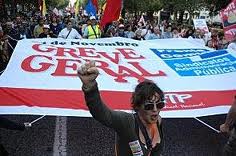
In the aftermath of the Greek bailout there was a lot of talk about the other vulnerable European economies that could have followed the collapse into bankruptcy of the Greek economy. Top of the list of vulnerable Euro zone economies were Portugal, Ireland, Italy and Spain. Of these, the three Mediterranean economies had been controversial additions to the Euro zone, as their economies were seen as weak and problematic, bringing vulnerability to the entire Euro project. Ireland on the other hand was a small economy with a well educated English-speaking population, and of little concern to planners. Most recently though, some of the largest and most militant demonstrations have occurred in Britain, where the Tory-Liberal Democrat coalition has implemented a harsh round of austerity measures, described as the most severe since the end of the Second World War. A common thread of the anti-government actions throughout Europe has been the demand the workers should not be forced to pay for a crisis that they did not cause. Continue reading “Fighting back in Europe”
Danny the Red
Don Franks
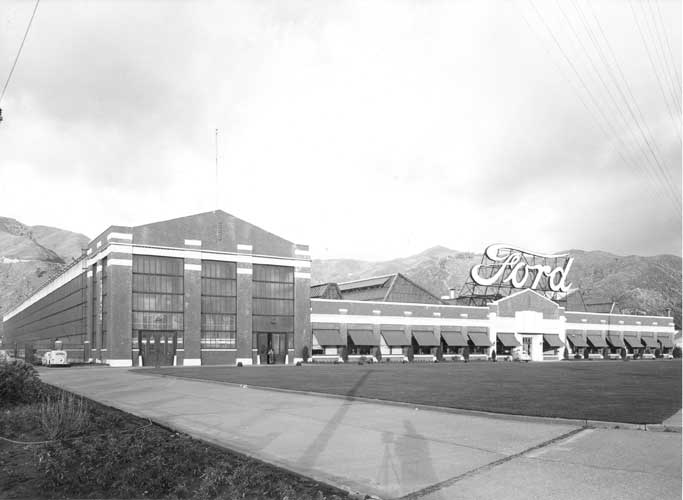
Because he once stood against Tom Skinner for FoL president, Danny Nichols will always rate at least a footnote in bourgeois labour movement history.
Which is more than most other shop floor militants get, because so much of our working class history never makes the scholarly pages. But it’s a simple fact that to thousands of Hutt Valley workers, their Danny the Red is literally remembered as a central figure of the last century.
Dennis Allan Nichols came from a dirt poor London working class family to seek a better life in New Zealand. In the late 1960s he got a job at Ford’s Lower Hutt car plant and for a while just kicked back and enjoyed the job security, relatively good pay and nice climate. He had an easy operation in charge of the phosphate machine and like other class savvy British immigrants, he made a comfortable niche for himself in the softer kiwi job environment.
But as time went on, Danny began to register the various injustices visited on less clued up workers in the unorganised plant. In those days there was no active union on site and foremen could and did sometimes clip a worker over the ear if he or she didn’t jump to it fast enough. Danny started making a few waves and began to revive the then defunct Coach and Motor Body Workers Union . In the course of this Danny got talking to union officials in the pub. Two of those officials were Ken Douglas and Pat Kelly. Ken suggested that the new fledgling car plant activists be delivered up to the Engineers Union. Pat came down to the plant and helped develop the Coach Workers into a radical independent job organisation. The main ingredients were a number of inexperienced but militant Maori line workers and Danny’s extraordinary leadership. Continue reading “Danny the Red”
Palestinian Organisations added to the New Zealand 'Terrorist List'
The Spark December 2010 – January 2011
Mike Walker
On the 12th of October 2010 John Key designated “a further seven international terrorist groups under the Terrorism Suppression Act”. He claimed it helped “implement our international obligations under United Nations Security Council Resolution 1373”. Under this pretence the addition of Palestinian organisations, Palestinian Islamic Jihad and the military wing of Hamas (Izz al-Din al-Qassam Brigades), to the New Zealand list of designated terrorists, is especially problematic. To highlight the hypocrisy and contradiction involved in these designations I will examine parts of the Terrorist Designations Working Groups (TDWG) paper; “Statement of case to designate the Palestinian Islamic Jihad (PIJ) as a terrorist entity”.
Terrorist Acts
A terrorist act is defined in the ‘Terrorist Suppression Act (TSA)’, section five, as an act which is carried out “for the purpose of advancing an ideological, political, or religious cause” or to “induce terror in a civilian population.” With outcomes such as “the death of, or serious bodily injury to, one or more persons”, “a serious risk to the health or safety of a population” or the “destruction of, or serious damage to, property of great value or importance, or major economic loss, or major environmental damage”. The case to designate PIJ features two case studies, used to highlight terrorist acts and support the case for designation. 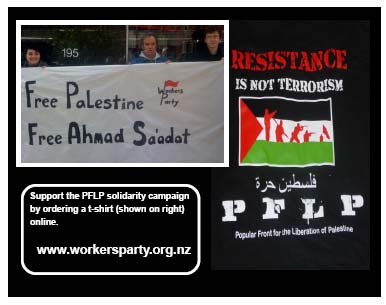 Continue reading “Palestinian Organisations added to the New Zealand 'Terrorist List'”
Continue reading “Palestinian Organisations added to the New Zealand 'Terrorist List'”

